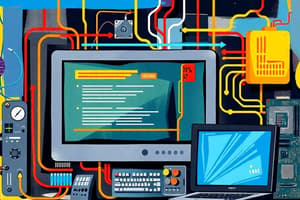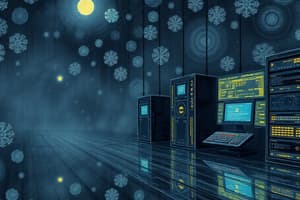Podcast
Questions and Answers
Which component stores data and instructions that the CPU uses to perform tasks?
Which component stores data and instructions that the CPU uses to perform tasks?
- Output Devices
- Input Devices
- Central Processing Unit (CPU) (correct)
- Storage Devices
What is responsible for executing instructions, performing calculations, and managing the system's resources in a computer system?
What is responsible for executing instructions, performing calculations, and managing the system's resources in a computer system?
- Central Processing Unit (CPU) (correct)
- Storage Devices
- Output Devices
- Memory
What type of device allows users to interact with the computer system?
What type of device allows users to interact with the computer system?
- Central Processing Unit (CPU)
- Storage Devices
- Output Devices
- Input Devices (correct)
Which physical components of a computer system are responsible for displaying and providing information to users?
Which physical components of a computer system are responsible for displaying and providing information to users?
What are peripherals in the context of computer systems?
What are peripherals in the context of computer systems?
Which category of software includes operating systems and device drivers?
Which category of software includes operating systems and device drivers?
What is the main function of system software?
What is the main function of system software?
What type of software consists of word processors and web browsers?
What type of software consists of word processors and web browsers?
How do hardware and software interact in a computer system?
How do hardware and software interact in a computer system?
In summary, what do computer fundamentals involve understanding?
In summary, what do computer fundamentals involve understanding?
Study Notes
Computer Fundamentals: Understanding Hardware and Software
Computer fundamentals are the basic concepts and principles that are essential for understanding how computers work. These fundamentals include two main components: hardware and software. In this article, we will explore both hardware and software, their functions, and their interactions in a computer system.
Hardware
Hardware refers to the physical components of a computer system, such as the central processing unit (CPU), memory, storage devices, input devices, output devices, and peripherals. Hardware is responsible for executing instructions, performing calculations, and providing input and output capabilities.
Some examples of hardware include:
-
Central Processing Unit (CPU): The CPU is the brain of the computer, responsible for executing instructions, performing calculations, and managing the system's resources.
-
Memory: Memory stores data and instructions that the CPU uses to perform tasks.
-
Storage Devices: Storage devices, such as hard disk drives (HDDs) and solid-state drives (SSDs), store large amounts of data and programs.
-
Input Devices: Input devices, such as keyboards, mice, and scanners, allow users to interact with the computer system.
-
Output Devices: Output devices, such as monitors, printers, and speakers, display and provide information to users.
-
Peripherals: Peripherals, such as external hard drives, USB drives, and printers, are connected to the computer to extend its capabilities.
Software
Software refers to the set of instructions and programs that run on the hardware of a computer system. Software can be classified into two main categories: system software and application software.
-
System Software: System software includes operating systems, device drivers, and utility programs that manage the computer's resources, support hardware devices, and perform basic tasks.
-
Application Software: Application software consists of programs designed to perform specific tasks for users, such as word processors, spreadsheets, and web browsers.
Interaction Between Hardware and Software
Hardware and software interact to create a functional computer system. The hardware provides the physical components and capabilities, while the software provides the instructions and programs that run on the hardware.
For example, when a user opens a word processing application, the CPU fetches the program's instructions from the storage device, loads them into memory, and executes them. The input devices, such as the keyboard, provide input to the computer system, which is processed by the CPU and displayed on the output devices, such as the monitor.
In summary, computer fundamentals involve understanding both hardware and software components. Hardware refers to the physical components of a computer system, while software consists of the instructions and programs that run on the hardware. The interaction between hardware and software creates a functional computer system that allows users to perform various tasks.
Studying That Suits You
Use AI to generate personalized quizzes and flashcards to suit your learning preferences.
Description
Test your knowledge on computer fundamentals, focusing on the concepts of hardware and software. This quiz covers topics such as the functions of hardware components, types of software, and the interaction between hardware and software in a computer system.




